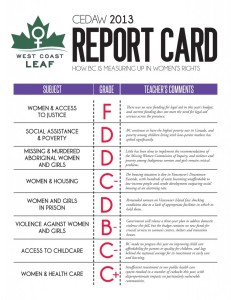CEDAW enshrines important protections for women in international human rights law. The UN CEDAW Committee is an international body of independent experts who are charged with monitoring state parties’ compliance and implementation of the Convention. Every four years, each country that has signed on to the Convention must report to the CEDAW Committee about how well it is measuring up to the CEDAW standards of women’s equality. Non-governmental organizations may also submit what are called “shadow reports”, expressing their views on that country’s CEDAW compliance.
Canada ratified CEDAW on December 10, 1981. In October and November of 2008, the CEDAW Committee considered the sixth and seventh reports from Canada, along with reports from local NGOs, and issued its observations on Canada’s compliance and implementation of the Convention. The BC CEDAW Group, a coalition of women’s organizations in BC including West Coast LEAF, produced a shadow report about the situation for women in BC.
The Committee was very concerned about a number of issues concerning women’s rights in Canada, and singled out some issues of significance in BC especially. The Committee took the unusual step of requiring Canada to report back to the Committee in a year on its progress on two issues of particular concern:
(1) establishing and monitoring minimum standards for the provision of funding to social assistance programs, and carrying out an impact assessment of social programs related to women’s rights; and
(2) examining the failure to investigate the cases of missing and murdered Aboriginal women, and to address those failures.
The Government of Canada submitted its response to these questions in February 2010, and the BC CEDAW Group submitted a shadow report entitled “Nothing to Report.” The UN Committee has not yet responded to these reports. Canada is due to make its next submission to the CEDAW Committee in December, 2014.
This Report Card measures how well BC is measuring up to some of the CEDAW obligations that fall within provincial jurisdiction, including these two areas of urgent concern to the Committee. For more information on our methodology and grading scheme used, please turn to the back cover of the Report Card.
So… How is BC measuring up to international legal standards of women’s equality?
The goal of West Coast LEAF’s CEDAW Report Card project is to raise public awareness about the shortcomings and successes of BC in meeting its international obligations on women’s rights, and to advocate for adequate responses to the CEDAW Committee’s concerns.
West Coast LEAF distributed a draft of the report card to a number of community organizations and representatives. We sought their written input and feedback, and engaged in telephone and in-person conversations as well. The feedback we received was extremely valuable in formulating the final version of this report card.





